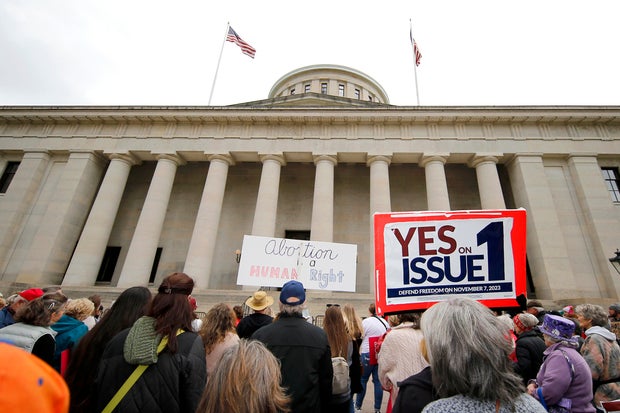Columbus, Ohio – Ohio’s farthest-reaching law restricting abortion was struck down Thursday by a county judge who said last year. Voter-approved amendment containing reproductive rights making heartbeat laws unconstitutional.
Enforcement of a 2019 law banning abortions in general if cardiac activity is detected — starting at six weeks of pregnancy, before many women know they’re pregnant — has been paused pending a challenge before Hamilton County Common Pleas Judge Christian Jenkins.
Jenkins said that when the US Supreme Court overturned Roe v. Wade and returning power over abortion issues to the states, “Ohio’s attorney general clearly didn’t get the memo.”
The judge said that Republican Attorney General Dave Yost’s request to leave all but one provision of the law, even though a majority of Ohio voters passed an amendment protecting the right to a pre-term abortion, “dispels the myth” that the high court’s decision only gives the state. power through the issue.
“Despite the adoption of a broad and strong constitutional amendment, in this case and others, the State of Ohio has sought not to preserve the constitutional protection of the right to abortion, but to curtail and limit it,” he wrote. Jenkins said his decision supports the will of voters.
Joe Maiorana / AP
Yost’s office said it is reviewing the order and will decide within 30 days whether to appeal.
“This is a very long and complex decision covering many issues, many of which are matters of first impression,” the office said in a statement, meaning it had not been decided by a previous court.
Jenkins’ decision comes in a lawsuit that the ACLU of Ohio, the Planned Parenthood Federation of America and the WilmerHale law firm brought on behalf of a group of abortion providers in the state, the second round of court filings for legal challenges.
“This is an important decision, demonstrating the power of Ohio’s new Reproductive Freedom Amendment in practice,” Jessie Hill, ACLU of Ohio associate attorney, said in a statement. “A six-week ban is completely unconstitutional and has no place in our laws.”
The initial lawsuit was brought in federal court in 2019, where the law was first blocked under the 1973 Roe v. Wade. It was temporarily allowed to take effect in 2022 after Roe was overturned. Opponents of the law then turned to the state court system, where the ban was again held. They support the law violates the protections in the Ohio constitution which guarantees individual liberty and equal protection, and it is unconstitutionally vague.
After his predecessor twice vetoed the measure citing Roe, Republican Ohio Governor Mike DeWine signed the 2019 law that the appointment by President Donald Trump then strengthened the conservative majority of the Supreme Court and increased hope among opponents of abortion.
The Ohio court has opened alongside a national upheaval over abortion rights which followed the Dobbs decision that overturned Roe, including constitutional amendments pushed in Ohio and a host of other states. Issue 1, Amendment Ohio Voters passed last year, giving everyone in Ohio “the right to make and exercise their own reproductive decisions.”
Yost acknowledged in a court filing this spring that the amendment made Ohio’s ban unconstitutional, but sought to preserve other elements of the 2019 law, including certain notice and reporting provisions.
Jenkins said retaining that element would mean it would subject doctors who perform abortions to felony criminal charges, fines, license suspension or revocation, and civil wrongful-death lawsuits — and would require patients to make two direct visits to the provider, wait 24 hours for the procedure and the abortion. which is recorded and reported.





